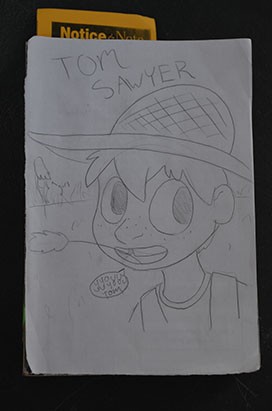Is Research Ruining Reading?
In our current curriculum, students are supposed to take irrelevant notes on their literature books, and I feel that the practice needs to be changed.

Photo Courtesy of Ryan Deitchman
A revised cover of a well-liked literature book, although a general consensus of students is that assignments distract from the writing itself. Many feel that they should instead write their notes about points that the kids find relevant.
October 31, 2014
I’ve spent the past year devoting nearly all my time, energy, and mind to doing homework, and I feel that a lot of it doesn’t help me learn. Literature books, especially, have led me to an embittered path of homework dread that I’d prefer not to tread on.
I absolutely love to read. The smell of the books, the feel of the pages, and the way people are able to craft words together is a magical experience. Sadly, that experience seems to have been ruined for me.
Take Mark Twain’s “Tom Sawyer,” for instance. It’s been one of my favorite school books to read thus far, but at the same time, the annotations that come with it are an absolute pain that distract from the reading itself. Technically, we are supposed to be looking deeper into the book with our annotations, but instead what we are looking for is the only thing we see. Everything else is skimmed over and forgotten. What makes it even worse is that when we participate in a discussion, I feel that half the kids don’t even know what occurred in the reading.
Now, with narratives, we have a type of annotation type called “signposts.” We look out for “Memory Moments,” “Aha Moments,” “Words of the Wiser,” “Contrasts and Contradictions,” “Tough Questions,” and “Again and Again.” They all are supposed to signify theme, or a plot shift, or foreshadowing, but students are so desperate to find these “signposts” that they find themselves making them up in order to earn their grade. We tend to panic if we haven’t marked more than three of these.
I respect the fact that with a book comes an assignment, but I also feel that the takeaway could be so much more. Instead of searching for set annotations, students could operate under their own emotions and feelings for a piece of text that stands out to them. This, I am sure, will help us connect the book to our own lives and to other curriculum, just as the teachers want us to.
Students are so caught up in their grade that they don’t comprehend or reflect on what they read and I see that it needs to be changed so that we can relate the book to our own lives.











